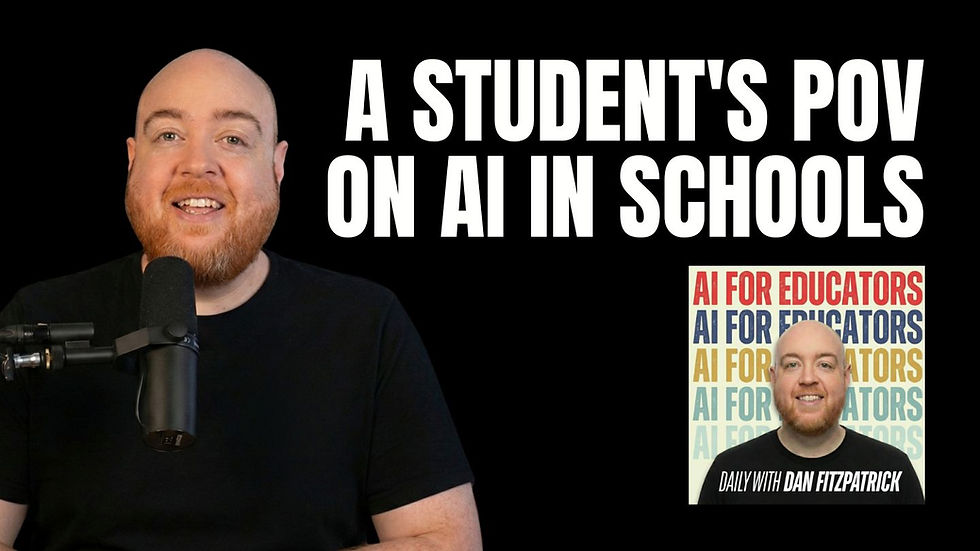Schools Are In A Liminal Space
- Dan Fitzpatrick
- Aug 2, 2024
- 4 min read
Once the stuff of science fiction, artificial intelligence is knocking at the doors of schools around the world.
As someone who works closely with educators, I see a mix of excitement and apprehension. I also witness this mix of emotions in students and their parents. Make no mistake, we are on the brink of a transformative era in society. The first step in preparing for it is to understand that we've been here before.
New technologies have always sparked fear and resistance throughout history. In ancient Greece, the philosopher Plato worried that written language would diminish true wisdom and memory. Fast forward to the 1600s and we find academics blaming the popularity of coffee houses for the decline of academic performance among students.
Historical anxieties remind us that fear of technology is not new. They show us that society has always found ways to adapt and thrive with new tools.

The Liminal Space
For years now, I have been communicating to schools, colleges and universities that they have entered a new "liminal space." A transitional phase where old norms are losing meaning and a new way hasn’t been fully formed yet. The most observant will know we have been in this stage for a while, but now AI is making it more obvious.
This period can be profoundly uncomfortable. It causes:
Existential uncertainty
Fragmentation as different groups adapt at different rates
Stress from the pressure to rapidly evolve
A sense of loss for the familiar
But liminal space is fertile ground for innovation. It's an opportunity to fundamentally rethink the education system that was built for a bygone time.
Navigating The Liminal Space
To navigate this transition successfully, I work with educators to embrace the PATHWAY framework:
Persevere in Uncertainty: Embrace the unknown as an opportunity for growth.
Awareness: Reflect on how these changes affect our children
Transform: Be open to redefining your role
Harmonize: Build supportive communities of those facing similar challenges.
Wonder: Approach new possibilities with curiosity and optimism.
Adventure: Experiment with AI tools
Yield Small Wins: Celebrate each success with AI, no matter how small.
Change Is Needed
The role of teachers will inevitably change. The ability of AI is progressing fast. Teachers will need to focus on:
Developing critical thinking skills
Fostering creativity and innovation
Providing emotional support and mentorship
Guiding ethical decision-making
Facilitating collaborative learning experiences
Schools will need to evolve into dynamic learning hubs that train teachers to develop these skills. They will need to facilitate:
Hands-on learning
Cross-disciplinary problem-solving
Emotional intelligence and social skills development
Real-world application of knowledge
The human elements of education will become more critical than ever. Some will refuse to change and some already have. Most education systems have failed to change from within, so they will need support with this. Support from us all, whether we are business owners, parents, government representatives, or anyone else invested in the future of our children.
Challenges
The first major challenge for schools is to recognize that they are in a liminal space. In my experience, most schools don’t know this yet. AI is just another tool that they will or won’t use. This naive view will inevitably lead to difficult times for them and their students if it sustains.
Once schools accept this opportunity, the future of AI in education will not be an easy path to tread. Key issues that must be considered are:
Equity: ensuring all children have access to powerful tools for learning, regardless of socioeconomic background.
Data privacy: protecting our children's information while leveraging data for powerful AI driven learning.
AI bias: recognizing and mitigating biases in AI algorithms that could disadvantage certain groups of children.
Digital literacy: allowing children to learn about AI and critically evaluate AI-generated information.
The goal of education remains the same. We want it to prepare our children for success in life, foster a love of learning and develop well-rounded individuals capable of tackling the challenges of their time.
Accepting the reality we are moving into doesn't mean our education systems need to abandon everything they know about learning. It's about leveraging new technology to enhance the ability to connect, inspire and educate.
The future of education is not something that will just happen. It's something that we will all have to actively shape.
Whenever you're ready, there are 3 ways I can help you:
1. The ChatGPT Survival Kit: My flagship course on getting started with generative AI using ChatGPT. The Busy Teacher's Guide to Taking Back Your Evenings With AI. Join 10k+ educators who have taken the course.
2. The AI Classroom Bestselling Book: Tens of thousands of educators on every continent have trusted this "Ultimate Guide to AI in Education", to springboard themselves into AI leadership. With a healthy balance of thought and practical guides, this book will supercharge your AI journey.
3. It's an honour to be an in-demand international keynote speaker on artificial education in education and business. I get to work with schools, colleges, universities and businesses to strategically integrate AI and help them be prepared for a future of disruptive technology. Click here to enquire about booking me.
_edited.png)


